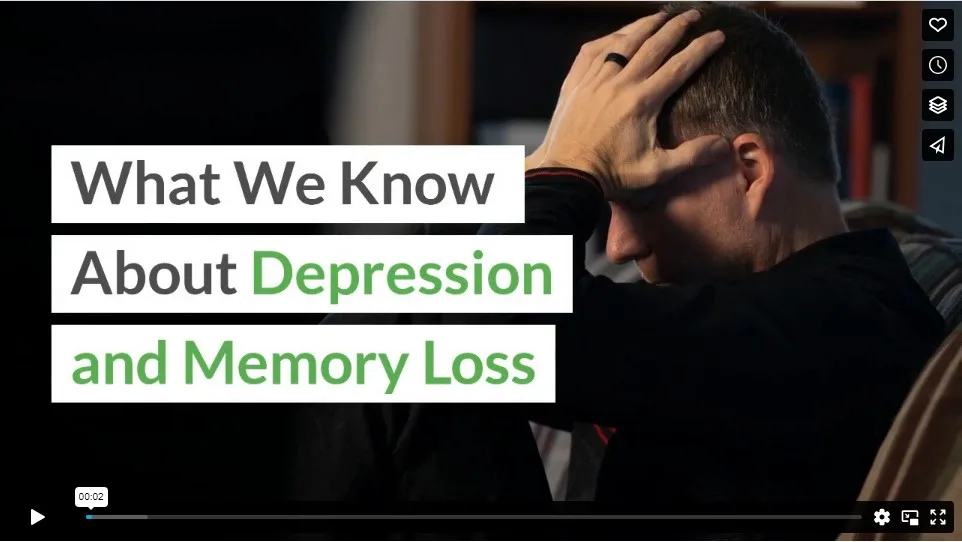Clinical depression is an illness that is often associated with stress, anxiety, and memory problems. While the first two symptoms are commonly grouped with depression, memory loss from depression is forgotten. Doctors may even misdiagnose memory loss associated with depression as dementia in older adults. Research is still ongoing to figure out how far-reaching depression related memory loss can be, but there’s a lot that we already know.
Depression Impairs Cognitive Performance
In 2013, young adults with depression struggled to identify objects on a screen and differentiate patterns. A 2015 study found that working memory was significantly impaired when depressive thoughts were present. These were some of the early studies establishing that depression disrupts short-term memory.
Depression can also impact your memory when you are in remission. A study published in 2014 found that people with a history of depression had greater negative cognitions of automatic and explicit processing levels than those who had never experienced depression. For example, people with prior depression were more likely to remember all the negative descriptive words from a list. Like in the movie, Inside Out, when Sadness touches a core memory, making it blue and tinged with sadness. This research suggests that your mind really does work like that. Once you have depression, it can continue to bias your memory even after treatment.
In addition to memory biases and short-term memory, depression can impact how you view your life story or autobiographical memories. Psychological Medicine published a study in 2018 showing that people with depression may struggle with recalling their own memories, which would explain why patients overgeneralize their life stories and have poor recall of specific details.
A 2014 meta-analysis of other studies found a clear association between depression and cognitive performance, specifically with memory, attention, and executive function. Your executive function is your critical and creative thinking, which is responsible for your skills to pay attention and focus on tasks, prioritize and problem solve, and self-monitor your behavior.
Dementia and Depression Are Linked
While it’s common for memory problems as you age to get chalked up to getting older or onset of Alzheimer’s or dementia, depression and dementia are closely linked. Researchers theorize that since depression and dementia lead to decreased levels of gray matter in your brain, the structural similarities may account for the same symptoms. Another study in the U.K. highlights that depression during your twenties is associated with poorer memory at 50 years old. Research is ongoing on long-term memory deficits, but unfortunately, researchers have established the link between depression and dementia.
Treatments Can Cause Memory Loss
Selective serotonin reuptake inhibitors (SSRIs) and tricyclic antidepressants are two popular classes of medication for depression. Researchers have found links between the drugs and memory loss; they can increase the risk of memory problems or a decline in cognitive function.
Electroconvulsive therapy (ECT) is a major depression disorder treatment performed under general anesthesia. You would typically undergo ECT when other treatment methods have failed. Doctors will send small currents of electricity through your brain to trigger short seizures. It alters your brain chemistry to reverse your symptoms of depression. However, you can experience confusion and short-term memory loss that may or may not return.
TMS experts perform an alternative depression treatment, like ECT, but without harmful side effects. If you think you are experiencing memory loss or are concerned about the potential with your current regimen, speak to your provider.
Other Causes of Memory Loss
- Hypothyroidism slows your metabolism, which slows your thinking and processing.
- Vitamin B-12 deficiency impacts the health of your nerve and red blood cells, which can lead to problems with your memory.
- A history of head trauma or minor head injuries can trigger memory problems. These can be cumulative, even if you don’t lose consciousness.
- Brain infections or tumors can make you look like you have dementia to doctors.
- Alcohol or other substance use can impair your processing and memory capabilities, especially if there’s an interaction between alcohol and medications.
- Some age-related memory loss shouldn’t concern you, but a doctor can check to see if it’s outside the norm.
Getting Your Memory Loss Diagnosed
Your doctor will perform a physical exam, ask you to answer some funny-sounding questions, and have you perform some basic memory tasks. This may be called a mini-mental state exam (MMSE.) Ensure you disclose all prescription, over-the-counter, and homeopathic medications you take. Your doctor will want to know if you’ve been anxious or sad recently, whether you’ve been sick recently or had a head injury, and how long you think you’ve been having memory problems. They may order blood work and imaging, like an MRI, or send you to see a specialist.
Depression is a complex diagnosis with evolving symptoms that can affect your cognitive functioning, not just limited to your memory. It can make it difficult for you to focus on work and make clear-headed, rational decisions. You may become forgetful or easily confused. Your memories may be clouded with sadness, even those you had before your depression. Or you may struggle to recall aspects of your life altogether. The sooner you get help, the more risks you can minimize or avoid; speak to your provider today about your concerns.
Video

